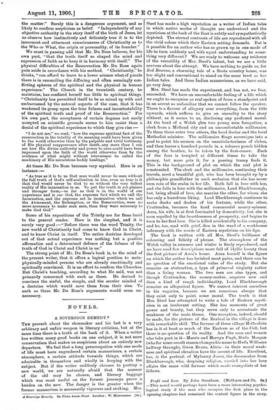NOVELS.
A SOVEREIGN REMEDY" THE proverb about the shoemaker and his last is a very arbitrary and unfair weapon in literary criticism, but at the same time there is a truth at the back of it. When a writer has written many good books on one subject, it is not mere conservatism that makes us suspicious about an entirely new departure. We feel that a long preoccupation with one mode of life must have engendered certain mannerisms, a certain atmosphere, a certain attitude towards things, which are admirable in themselves and wholly in keeping with the subject. But if the writer suddenly chooses to portray a new world, we are naturally afraid that the manner of the old may be chosen, and literary baggage which was most useful on the former journeys prove a burden on the new. The danger is the greater when the former mannerism is necessarily vigorous and striking. Mrs.
A Sovereign Remedy. By Flora Annie Steel. London W. Heinemann. [Ge.] Steel has made a high reputation as a writer of Indian tales in which native modes of thought are understood and the mysticism at the back of the East is subtly and sympathetically depicted. The eternal contrasts of life are reproduced with all the vivid colour which their Eastern setting demands. But is it possible for an author who has so grown up in one mode of life to turn suddenly and with equal understanding to some- thing very different ? We are ready to welcome any evidence of the versatility of Mrs. Steel's talent, but we are a little nervous about the attempt. We have nothing to guide us, for Red Rowans, a charming tale of a Scots country house, was too alight and conventional to stand on the same level as her Indian tales. And these Indian mannerisms, as we have said, go very deep.
Mrs. Steel has made the experiment, and has not, we fear, succeeded. We have an uncomfortable feeling of a life which we ought to recognise as real spoken of from a standpoint and in an accent so unfamiliar that we cannot follow the speaker. There is a flavour of allegory over everything, from the title upwards, which suffices to give an unreality to the story without, as it seems to us, disclosing any profound moral. At the head of a Welsh glen two young men foregather, a clerk from a Midland city and an uncomfortable millionaire. To them there enter two others, the local doctor and the local Methodist minister. The millionaire flings sovereigns into a pool to point his sermon on the uneatisfa.ctoriness of Aches, and then leaves a hundred pounds in a tobacco pouch hidden among the heather, to be taken by the first-comer. Each of the four is tempted at different times to take the money, but none gets it, for a passing tramp finds it. This is the background of plot on which the real plot is constructed. The clerk and the millionaire, continuing their travels, meet a beautiful girl, who has been brought up by a philosophic grandfather in such seclusion that she has never seen coin of the realm in her life. Both fall in love with her, and she falls in love with the millionaire, Lord Blackborougb; but, being afraid of love, she marries the other, for whom she has only a humdrum liking. Lord Blackborough continues to make ducks and drakes of his fortune, while the other, Cruttenden, becomes the hard commercial money-spinner. Aura, his wife, is at first fascinated by domesticity, but she is soon repelled by the heartlessness of prosperity, and begins to turn to her first love. She is killed accidentally in his company, and he, too, mad with grief, dies in the ward of a workhouse infirmary with the words of Eastern mysticism on his lips.
The book is written with all Mrs. Steel's brilliance of colouring and felicity of phrase. The atmosphere of the Welsh valley in summer and winter is finely reproduced, and we have read few descriptions more full of idyllic beauty than the first picture of Aura's home. Aura herself is the figure on which the author has lavished most pains, and there can be no question of the emotional value of the study. But she remains an abstraction, a type of primeval virginity rather than a living woman. The two men are also types, and though Cruttenden, the money-maker, acquires now and then a kind of rough individuality, Lord Blackborough remains an allegorical figure. We cannot interest ourselves in his vagaries, because we are conscious always that they exist only to point some moral. The truth is that Mrs. Steel has attempted to write a tale of Eastern mysti- cism in an irrelevant setting. She has moments of great power and beauty, but they serve only to accentuate the weakness of the main theme. One exception, indeed, should be made, for the picture of the Revival in the village is done with remarkable skill. The fervour of these village Methodists has in it at least as much of the Eastern as of the Celt, but there is no question of its reality. And the men and women who take part in it—Morris and Mervyn Pugh, Hwfa Morgan (who for some occult reason changes his name to Hwfa Williams halfway through), Gwen Evans, Alicia—in their moral weak- ness and spiritual elevation have the accent of life. Excellent, too, is the portrait of Myfanwy Jones, the dressmaker from Blackborough, who, despising religion, earried into her love affairs the same wild fervour which made evangelists of her fellows.


































 Previous page
Previous page